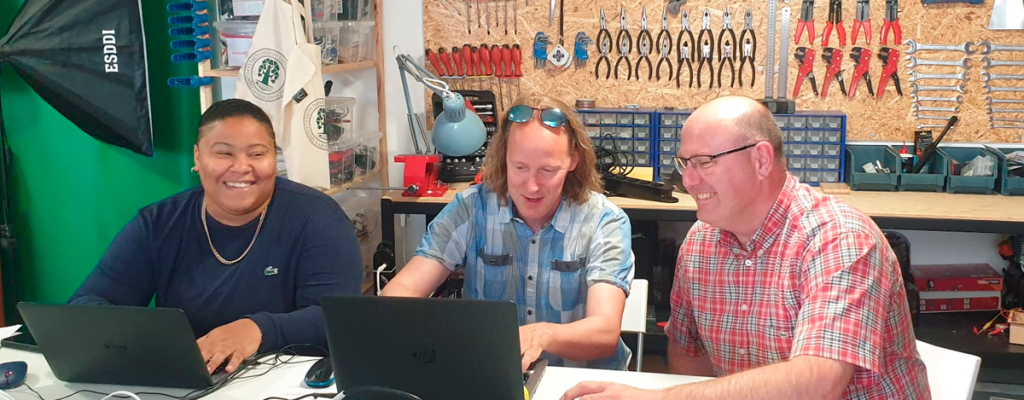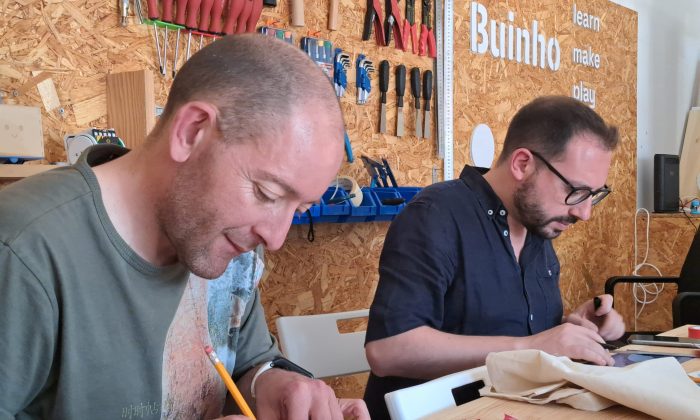Makerspaces in school education
Buinho Education is a sub-branch of Buinho, a fablab located in the South of Portugal (www.buinho.pt). We were the first and still only project of the kind in this region, having introduced since 2015 the contributes of Maker Education to public schools and local communities in the fields of digital fabrication, coding, and robotics.
Buinho has been coordinating several Erasmus projects since 2017.
We currently coordinate an Erasmus consortium (PT01-KA121-SCH-000010598) dedicated to the mission of increasing the digital proficiency in all public schools of the neighbouring municipalities, mostly in the fields of coding and robotics. And we are working with more than 20 local public schools in the development and teaching of digital competencies to both students and teachers from six different municipalities.



COURSE DESCRIPTION
It is this unique experience of being a fablab that has helped create several school makerspaces that we want to share with other European Schools that aim to create similar dynamics but don’t know exactly where to start. It’s due to this experience that we can advise on what is the most effective solutions adjusted to the available budget, and it’s based on the daily practice that we better explain how these spaces can operate to produce high-quality educational results.
But this course offers more than this. It will also offer the possibility of participants to have a practical engagement and experience with the most popular equipment in Makerspaces nowadays. By being a fablab and managing a group of educational Makerspaces in Messejana, Buinho can offer the unique experience of taking this course within a real makerspace and together with us better understand the advantages and limitations of each piece of equipment.
This course is aimed at school coordinators or teachers that have the ambition to create and operate a Makerspace within their school premises. With this course, you will learn how a Makerspace works, how it is divided into working sections, and what are the general aspects you should take into consideration while designing the space. You will also learn how to use digital fabrication technology such as laser cutters, 3D printers, Vinyl Cutters, or CNC Mills. You will have the opportunity to test and experiment with different Robotic Educational Kits and get to know the most suitable solutions to introduce physical coding and STEAM in your classroom. You will also have the opportunity to experiment with emerging technology and methodologies such as virtual and augmented reality, Artificial intelligence, and product Hacking, setting up the space for the future of school digital education.
You will also have the opportunity to get to know some of our approaches and strategies to enable the creation of low-cost makerspaces in public schools while covering all the logistic and safety measures that reduce associated risks.
Finally, and with this short course, you will be able to perform a short job shadowing activity in a local school, where you will be introduced to some significant projects and opportunities given by the new Erasmus program to the school sector.
Target Groups – Elementary, Middle and Secondary School deans, school coordinators, and department coordinators
Duration of the course – Five days
Total Cost of the Course – 400€
Note: Each class will have a maximum of 12 participants to provide higher quality standards and more individualized support.



Timetable
Day 1
10:00 – 11:00
Welcome session and introduction
We will receive the participants in the working space, making a short introduction to Buinho’s experience in the educational field. We will also dedicate some time to getting to know the participants but also their sending schools. You can bring a presentation.
13:00 – 15:00
Introduction to the Micro:bit
We will start things off with a very practical and introductory to the most popular micro-controller in schools today – the micro:bit. In this workshop we will not only learn the basics of coding for the inbuilt features of the micro:bit but also teach you how we can control external devices by using the extensions. At the end of this workshop we will offer you a brand new Micro:bit to take to your school and practice what you learned with your students.
Day 2
9:00 – 12:00
Toy Hacking
On the second day of our workshop series, we will kick off with a deep dive into cutting-edge classroom STEAM techniques, focusing on electronics and robotics through the exciting world of Toy Hacking. In this session, participants will learn how to give a new life to an old toy, changing its function and the way we interact with it. Besides learning a quick introduction to electronics, how to use a multimeter, and solder, the participants will learn how to transform a fluffy toy into a bluetooth speaker to bring back home.
13:00 – 15:00
Makey Makey
Makey Makey is a very simple micro-controller that uses resistive sensing to turn everyday objects into keyboard inputs, including random items like fruit, play-doh, or water. You will learn how to use the Makey Makey and program it using Scratch. Following that, you’ll collaborate in groups to craft an interactive-talking poster, an enjoyable STEAM project suitable for students of all ages.
Day 3
10:00 – 18:00
Cultural Day
We are presenting the opportunity for a group visit to Cascais and Cabo da Roca as part of our cultural offering. This will include a visit to the Paula Rego Museum, a visit to an historic Lighthouse, having lunch by the sea, shopping in the beautiful town center of Cascais, and to finish the day, a visit to Cabo da Roca – the most Western point of Europe.
Cascais is world famous for its bay, for being the town of the exiled Kings, or for being known as the Portuguese Côte D’Azur. Many centuries of History has contributed to making this fisherman village, into one of the most desirable tourist destinations in Portugal. We will also have a walk through the Estoril – Cascais seaside promenade, so bring comfortable shoes!
Day 4
9:00 – 12:00
Digital Fabrication – 3D Printing and 3D Modelling in the classroom
We will dedicate the second day of training to introducing the most common and relevant digital fabrication technologies to make a presence in a Makerspace. We will start with 3D printing technology, which will be complemented with a short exercise in 3D modeling. By the end of the morning, participants would have successfully designed and 3D printed a small remembrance of this workshop to take back home.
13:00 – 15:00
Digital Fabrication – Introduction to Lasercutting and Vinyl cutting technologies
After 3D printing and Robotics, we move on to the other two most popular technologies within Makerspaces – Lasercutters and Vinyl cutters. In this workshop participants will have the opportunity to work directly with these types of equipment and experiment with different materials and solutions. We will explain the reasons why the laser cutters are the most versatile of the makerspace pieces of equipment, but also why a vinyl cutter can be a cheaper solution than can transform a whole school. We will also have the opportunity to share STEAM approaches and handy craft techniques that will help schools to democratize the access to digital fabrication and take the most advantage of these equipment’s.
Day 5
10:00 – 11:00
Final discussions, e-learning platform, and amazing brunch in the Makerspace!
For the last day Buinho organized a final morning brunch to commemorate the end of the training. Participants will receive a quick introduction to the Maker Movement and its importance for school Education in digital competencies and innovative non-formal education methodologies. We will also provide to all of our students access to our e-learning platform where you will find free online content that our team prepared specially for each course we provide.
After presenting these and other useful contents for your future activities in the classroom we will have an opportunity to further discuss, and in an informal environment, the next steps when returning to the school. It will also give us the opportunity to share some best practices and advises according to each participant specific reality and fear. This includes sharing of activities, methodology, and evaluation strategies
11:00 – 12:00
Delivery of the final certificates
To finalize these five days training course we will take the group session, prepare a final surprise gift for all participants and deliver the final certificates of attendance.